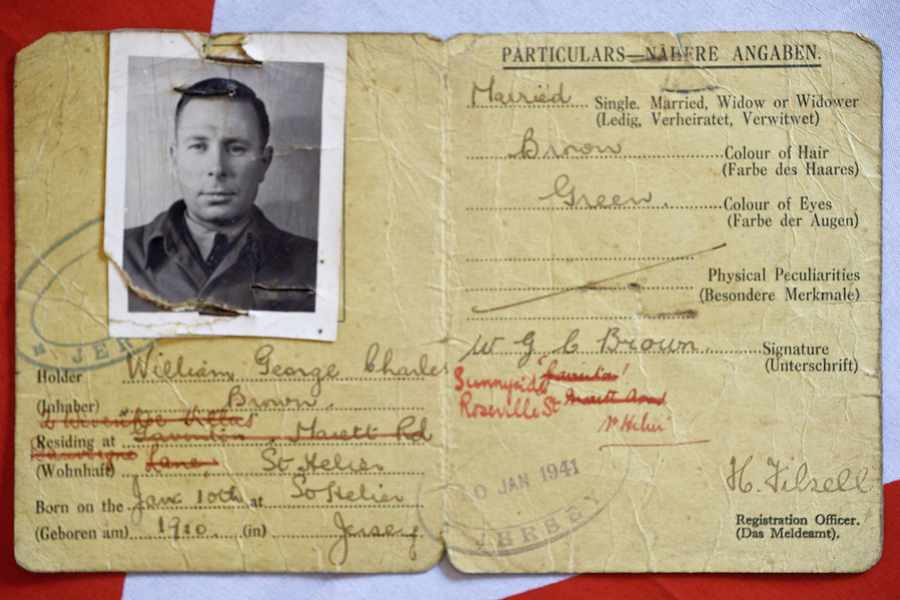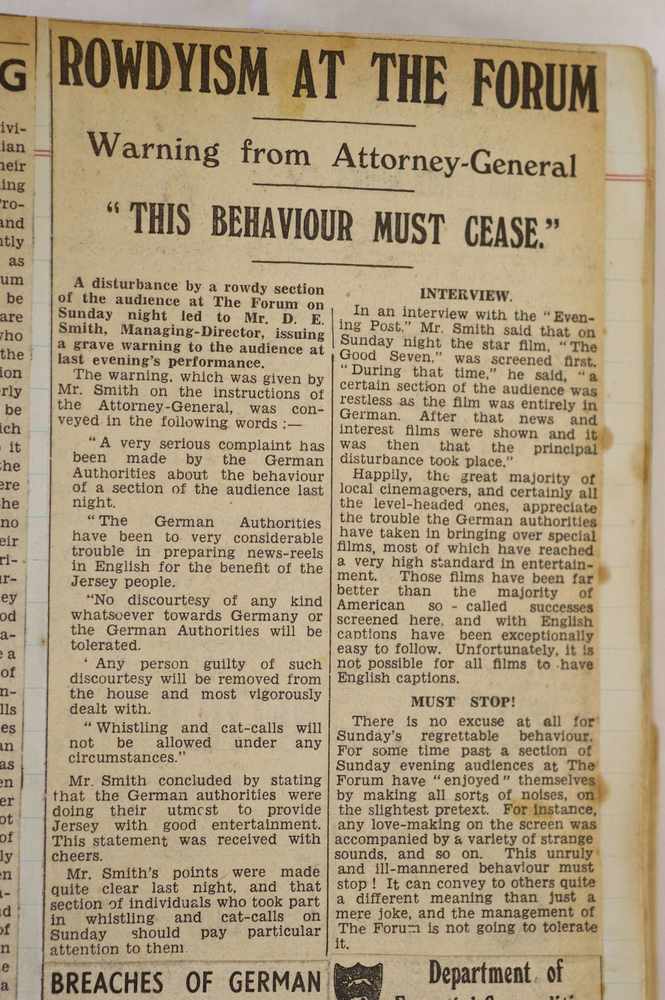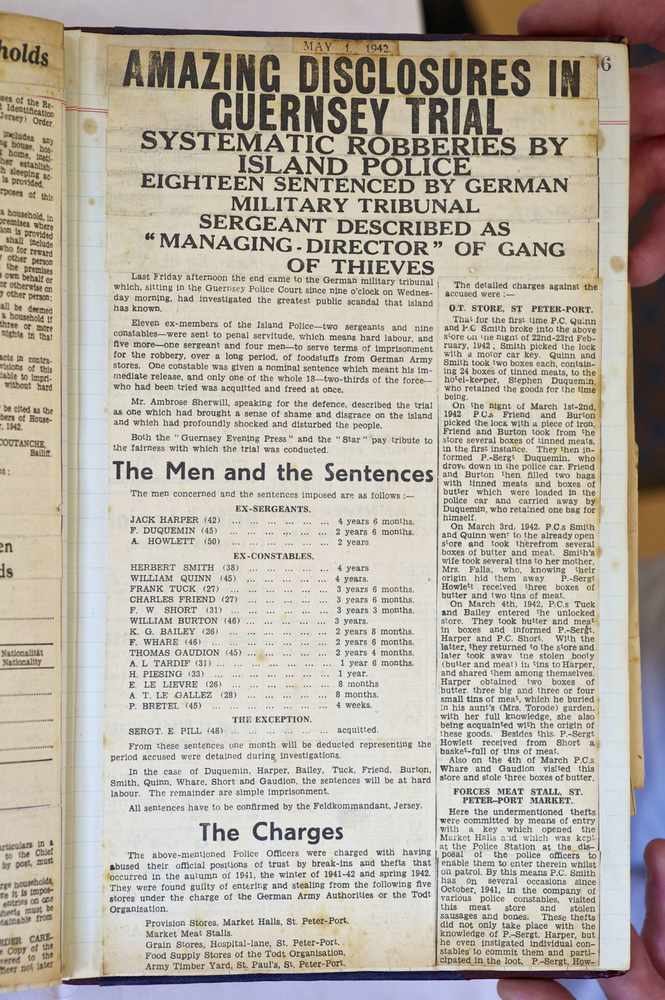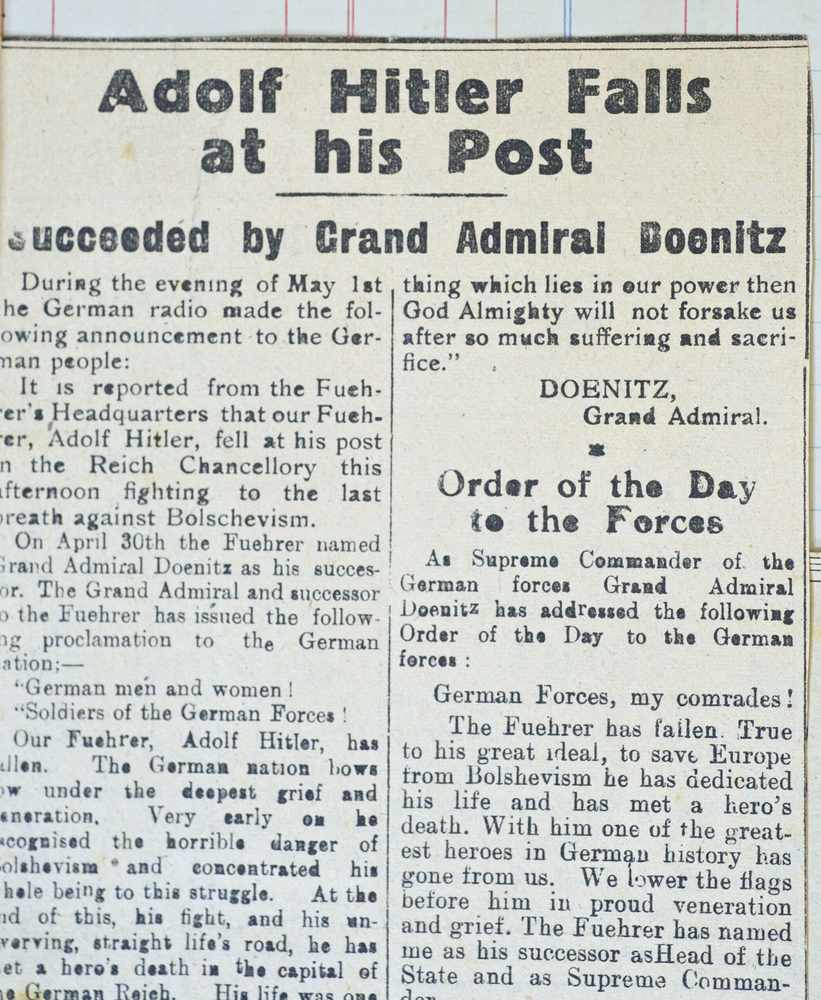A treasured scrapbook of Occupation news cuttings has been on display to the public this week. But what were the stories that grabbed the headlines in Jersey in the 1940s?
IT is said that today’s front page is tomorrow’s fish and chip paper – but that was not the case for Islander William Brown.
Mr Brown, a Jersey policeman during the Second World War, took great care to document the news as reported by the Evening Post (the former name of the JEP).
The book can be viewed for free here
Over the course of five of the Island’s darkest years he kept a scrapbook of day-to-day news as well as reports of bigger events published by the paper.
The 197-page volume has been digitised and published online by the Channel Islands Occupation Society.
This week the group held a series of open days at St Mary’s Parish Hall, which conclude tomorrow, to display their collection of memorabilia, which now includes Mr Brown’s scrapbook.
The open days also included Occupation food tasting, with several schools bringing students to the event.
Now known as the William Brown Ledger, the book was donated to the CIOS by Mr Brown’s son Roger, who still lives in the Island.
It is an amazing piece of social history that gives a snapshot of Island life from 1940 to 1945.

While compiling the book Mr Brown was called before German authorities who asked why he was saving news cuttings, but he was allowed to continue after they accepted he was simply recording public information.
Mr Isherwood said the ledger had provoked great interest for the CIOS event.
It also contains the headline ‘The Channel Islands free again’ when the paper reported the Liberation on Wednesday 9 May 1945.
Following that a special Liberation Day supplement was produced showing pictures from the celebrations and ensuing Royal visit.
Mr Isherwood said: ‘The open days have been fantastic. Students were very appreciative and found it all interesting.
‘It was very rewarding. I think it was more successful than I thought it was going to be.’
Here are a selection of stories taken from the William Brown Ledger that give an insight to what was being reported while German forces controlled Jersey:
ONE of the biggest stories for the Evening Post followed Germany’s bombing of harbours in Jersey and Guernsey on 28 June 1940.
Nine people in the Island were killed with many more injured. Guernsey lost 33 in the attack.
The following day the EP reported: ‘The raid started at about 7 pm. An “E.P.” reporter who lives in St Clement’s heard the sound of aircraft engines flying low and, going outside with field glasses, saw three medium bombers in formation flying in the direction of St Helier, low enough for the black crosses under their wings to be plainly seen with the naked eye.’
The report goes on to give eye-witness accounts of the scene at the Albert Pier where bombs were dropped.
‘What happened on the Albert Pier is best described by two men who were actually present, Mr. R. K. Troy, the stevedore in charge of the loading of a ship, and Mr J. A. Laurens, of 17, Poonah-road, who was working with him,’ the report says.
“We saw machines come over,” said Mr Troy, “but we took little notice at first, for we have seen so many German planes lately.
“Suddenly I heard machine-gunning and realised that they were attacking and that we were the target. I shouted to the men to take cover and I myself got under a crane, and only then realised that there was little or no shelter there, as the crane was one of the high gantry type. The men scattered all over the place, some under lorries and others under stacks of sacks. Coming over as they did from the Fort we had no protection for the high wall of the walk was unfortunately behind us. Mr Truscott and another craneman were hit by machine-gun bullets, and others of my gang, Messrs. W. Tirel, Connors and Wilson, were also wounded, Mr Tirel having his toes completely shot off.”‘
The German/English dictionary
By July 1940 German troops were in the Island.
Soon after the EP published a basic dictionary so soldiers and Islanders could begin understanding a little of each others’ languages.
The columns showed a list of German words, their phonetic pronunciation in English, the English translation and English phonetic pronunciation for Germans.
- Strasse. Strazer. Street. Striet.
- Montag. Mohn-tag. Monday. Mandey.
- Abend. Ah-bnd. Evening. Aevning.
- Monat. Moh-nat. Month. Mans.
- Eins. Eyenz. One. Uwan.
I appeal to you to maintain your calm and dignity in the hours which lie ahead and to refrain from all forms of demonstration.
It is my earnest wish that service should be held in all places of worship in the same manner as services are being held in the United Kingdom and in other parts of the Empire.
I feel that the conclusion of the Prime Minister’s speech this afternoon will be the appropriate moment for the hoisting of flags, and I make the strongest appeal to you, in the interests of public order, not to fly flags before that time.
I was present last evening at the release from custody of the majority of the political prisoners and I am doing all in my power to obtain the immediate release of the remainder of them.
I shall make known to you immediately any further developments.
A.M. Coutanche, Bailiff. May 8th 1945.
Cinema rowdyism

TOWARDS the end of July 1940 the Attorney-General issued a warning to Islanders who had apparently been misbehaving at a local cinema.
A sub-heading of the article, which was titled ‘Rowdyism at the Forum’, said: ‘This behaviour must cease.’
The article carried a message from Mr D. E. Smith, the Forum’s managing director, which said: ‘A very serious complaint has been made by the German Authorities about the behaviour of a section of the audience last night.
A notice in the paper read: An order has been issued to managers of local cinemas that in future smoking must not be permitted during performances. A few days ago this order was issued to the troops, now it has been extended to include civilians also.
‘The German Authorities have been to very considerable trouble in preparing news-reels in English for the benefit of the Jersey people.
‘No discourtesy of any kind whatsoever towards Germany or the German Authorities will be tolerated.
‘Any person guilty of such discourtesy will be removed from the house and most vigorously dealt with.
‘Whistling and cat-calls will not be allowed under any circumstances.’
The article, which includes an interview with Mr Smith, revealed that a ‘variety of strange sounds’ had been made by patrons when scenes of love-making had been screened.
AS well as news of the day, the William Brown Ledger serves as a record of socio-economic information too.
Its pages contain a census report from the States Labour Department following a survey on 10 August 1940.
The report said that Jersey had seen a considerable increase in population between 1931 and 1939, but evacuation meant that thousands fled the Island before the arrival of German troops.
The census recorded:
- 41,101 people lived in Jersey, made up of 18,773 men and 22,328 women.
- A decrease of more than 9,000 residents compared to the April 1931 census, which recorded the population as 50,462.
- The reduction in residents was mainly from St Helier.
- St Clement recorded an increase of 412 residents, St Lawrence of 67 and St Mary of 51 compared to 1931.
Translation of a communication addressed to the governor of the Isle of Jersey Evening Post
1st July, 1940.
To the chief of the military and civil authorities Jersey (St Helier).
1) I intend to neutralize military establishments in Jersey by occupation.
2) As evidence that the Island will surrender the military and other establishments without resistance and without destroying them, a large White Cross is to be shown as follows, from 7 am July 2nd, 1940. A) In the centre of the Airport in the East of the Island. B) On the highest point of the fortifications of the port. C) On the square to the North of the Inner Basin of the Harbour. Moreover all fortifications, buildings, establishments and houses are to show the White Flag.
3) If these signs of peaceful surrender are not observed by 7 am, July 2nd, heavy bombardment will take place. A) against all military objects. B) against all establishments and objects useful for defence.
4) The signs of surrender must remain up to the time of the occupation of the Island by German troops.
5) Representatives of the Authorities must stay at the Airport until the occupation.
6) All Radio traffic and other communications with Authorities outside the Island will be considered hostile actions and will be followed by bombardment.
7) Every hostile action against my representatives will be followed by bombardment.
8) In case of peaceful surrender, the lives, properties and liberty of peaceful inhabitants are solemnly guaranteed.
IN May 1942 the EP carried the headline ‘Amazing disclosure in Guernsey trial’ when news broke over the water of a series of robberies masterminded by Sarnian police.
The paper published an in-depth report of the proceedings on 1 May that year.
It began: ‘Last Friday afternoon the end came to the German military tribunal which, sitting in the Guernsey Police Court since nine o’clock on Wednesday morning, had investigated the greatest public scandal that island has known.
‘Eleven ex-members of the Island Police – two sergeants and nine constables – were sent to penal servitude, which means hard labour, and five more – one sergeant and four men – to serve terms of imprisonment for the robbery, over a long period, of foodstuffs from German Army stores. One constable was given a nominal sentence which meant his immediate release, and only one of the whole 18 – two thirds of the force – who had been tried was acquitted and freed at once.
‘Mr Ambrose Sherwill, speaking for the defence, described the trial as one which had brought a sense of shame and disgrace on the island and which had profoundly shocked and disturbed the people.’

Night-time daubings
THE strange tail of swastikas appearing in town was recently revealed in the JEP – decades after the incident occurred.
The symbol of the Nazis’ supposed superiority came to be used as a black mark by Islanders during the Occupation, and would be daubed on the homes of alleged collaborators, black marketeers or those thought to be getting too close to the occupying forces.
On Saturday 28 October 1944 the EP carried a report of young men ‘daubing’ houses ‘under cover of darkness’.
It warned that if such behaviour continued Islanders faced having their curfew hours tightened.
In a bizarre twist a year later, officers were ordered to paint swastikas on St Helier homes at night in an effort to save one German officer and his supposed local mistress the embarrassment of identification after signs were painted on their homes.
Slave workers were later ordered to remove the swastikas, which had been painted on using a heavy tar-like substance.
Shipping facilities are being provided by His Majesty’s Government for the immediate voluntary evacuation to the United Kingdomof women and children. Similar facilities will also be available for men between the ages of 20 and 33 who wish to join His Majesty’s Forces and, so far as accommodation permits, for other men.
‘The names and addresses of all women and children (and of all such men other than persons for whom tickets have already been bought from the Southern Railway) should be handed in at the special office at the Town Hall before 10 o’clock tonight, Wednesday June the 19th, or between 6 am and 10 am tomorrow, Thursday June the 20th.
‘Information will, in the case of women and children be required to be given as to whether arrangements have been, or will be made privately for the accommodation and maintenance in the United Kingdom or whether accommodation and maintenance should be provided for them by the appropriate United Kingdom authorities.’

Harbours bombed heavy casualties in both islands
Nine people are known to have been killed and many injured in a bombing and machine-gunning attack carried out by at least three and perhaps more German aircraft over Jersey last night.
The Harbour was the chief objective apparently and a bomb struck the pier.
Others fell in the Mulcaster Street and Commercial Buildings areas, causing considerable damage to property belonging solely to civilians.
Pregnant Russian working women are badly in need of baby clothes.
Any kind person who has unrequired baby clothes and is willing to help, write or deliver to Organisation Todt, Midvale Road, Room 4.






